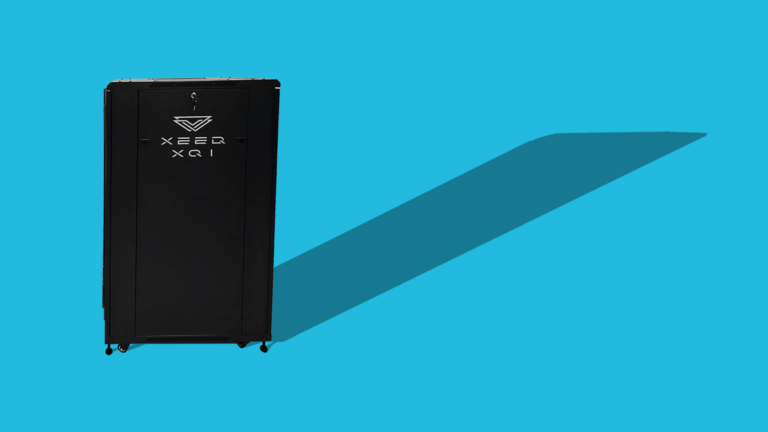With the delivery of our first quantum computer – a 4-qubit system based on NV centers from the Leipzig startup XeedQ – we will soon have reached a major milestone: As soon as all necessary tests have been completed by the manufacturer, our research teams will be in the history of DLR direct access to its own quantum computing hardware. With it, DLR will further expand its own competencies in the field of quantum computing and at the same time accelerate the development of quantum computers for industrial use.
As the DLR quantum computing initiative, we have set out to pave the way for quantum computers from basic research to industrial application. This can not be done overnight. And there are still many challenges in developing the necessary technologies and structural requirements before quantum computers can be used commercially on a large scale.
We want to accelerate this development, upgrade the already existing quantum technology ecosystem and expand our own expertise in this area. That’s why we enable startups, SMEs and industry to develop exactly the complete systems, enabling technologies and applications that are necessary for a breakthrough in quantum computing with us as an anchor customer.
To this end, we are also setting the conditions for further growth of the market: Through our orders and networking work, we are strengthening know-how and expertise in important areas of quantum computing and creating a lively, sustainable ecosystem. For example, at our two innovation centers in Hamburg and Ulm, precisely the networks are created that inspire technology transfer and innovation between research and business and offer specialists an attractive environment.
Presentation in the Innovation Center Ulm
This moment is all the more important for us: As the first of the companies we commissioned, the start-up XeedQ from Leipzig delivered a quantum computer to the DLR Innovation Center in Ulm: XQ1i is a 4-qubit system based on NV centers. It is mobile, operates at room temperature and can be controlled with a WiFi-enabled computer or tablet. Above all, it offers us transparent access to the qubits. For example, our users can design their own gates and control the hardware directly.
For our DLR research teams, this means that they can now carry out initial experiments and gain practical experience for their application projects. They will be able to transfer this experience with the XQ1i system to future, more complex NV-center quantum computers.

QCI head Robert Axmann (left) presents the XQ1i to the audience at the 3. Austauschforum Quantencomputing of the DLR QCI. Also on stage from left to right: Karsten Lemmer (DLR), Ina Schieferdecker (BMBF), Bernhard Kluttig (BMWK)
However, this knowledge will also help the DLR teams to bring ideas from basic research to industrial application and to incorporate them into other quantum technology projects of the DLR institutes and research areas. Direct access to our own quantum hardware already enables us to expand our know-how in the field of quantum computing and other quantum technologies and to apply this knowledge.
Direct access to own NV center hardware
But XQ1i is just the beginning of the QCI project XQi: By the end of 2026, XeedQ will provide us with a fully functional, robust and scalable diamond spin-based quantum computer with more than 32 qubits. The QCI order enables XeedQ to develop this idea with the security of a reliable partner and the advantages of a dense ecosystem of research and industrial projects at the QCI locations in Hamburg and Ulm.
The XQ1i project is one of two projects commissioned by us for the delivery of NV-centre-based quantum computers. We placed a similar order with the Leipzig startup SaxonQ in December. To do this, we commissioned two other startups to further develop spin-enabling technologies to support the NV center ecosystem. Overall, with these orders at the Innovation Center Ulm, we are creating a unique environment for research and development of NV center technologies.
A big step for the DLR
“The entire NV center ecosystem will benefit from the delivery of the XQ1i: Together with our startups and DLR research teams, we will improve the supply of diamond chips for quantum computers in the long term.”
Michael Höse, project manager DLR QCI
After the initial commissioning, extensive tests and acceptance will follow before the delivered system can be used by the DLR QCI application projects. Meanwhile, work on our other hardware projects is in full swing: we have currently commissioned a total of 16 hardware systems from industrial partners and DLR institutes, including ion-trap and photon-based quantum computers, important enabling technologies and complementary analog computer projects.
This broad technological basis and full depth of added value from auxiliary technology to application makes the task of the DLR Quantum Computing Initiative so unique: We are expanding our own expertise and strengthening the entire quantum computing ecosystem. Our first quantum computer is a big step towards this goal.
NV centers | Nitrogen vacancies
Due to their high reliability and – relatively – simple implementation, qubits based on nitrogen-vacancy (NV) centres are a promising technological approach for quantum computing. They do not require any cooling and can therefore also be used in mobile applications – a major advantage over other, more complex systems. This enables mobile quantum computers, for example in aircraft and satellites. However, NV centres can do more than just calculate. Because they are sensitive to magnetic fields, they can also be used as extremely sensitive quantum sensors with a wide range of applications.














